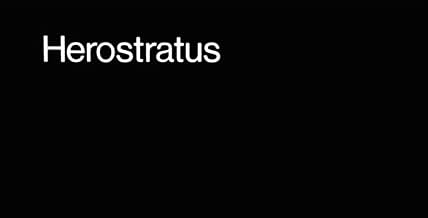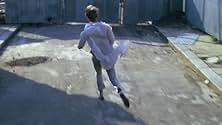Füge eine Handlung in deiner Sprache hinzuWhen young poet Max (Michael Gothard) hires a marketing company to turn his suicide-by-jumping into a mass-media spectacle, he finds that his subversive intentions are quickly diluted into a... Alles lesenWhen young poet Max (Michael Gothard) hires a marketing company to turn his suicide-by-jumping into a mass-media spectacle, he finds that his subversive intentions are quickly diluted into a reactionary gesture, and his motivations are revealed as a desperate attempt to seek atte... Alles lesenWhen young poet Max (Michael Gothard) hires a marketing company to turn his suicide-by-jumping into a mass-media spectacle, he finds that his subversive intentions are quickly diluted into a reactionary gesture, and his motivations are revealed as a desperate attempt to seek attention through celebrity.
- Sandy
- (as Mona Chin)
- Radio Presenter
- (Synchronisation)
- Poet
- (Synchronisation)
- Patient on Bed
- (Nicht genannt)
Empfohlene Bewertungen
A film by Don Levy (1967)
Herostratus is the first feature film by Don Levy whose short films have been distinguished by their original technique and penetrating approach to their subject.
Herostratus is in the same tradition. The story, on the surface, seems simple. A young man wants to commit suicide publicly and in the presence of as many people as possible. He persuades a public relations firm to exploit the event then he changes his mind but by this time other forces are active and he is no longer in control of the situation.
Levy exposes his characters and their motives layer by layer. He does so in the context of a society whose aims and aspirations are centered on private gain and personal success, virtually at any price; in this society the idealism and humanism which can unify a country after a war are rapidly displaced by destructive self-interest. It is not enough, in Levy's view, to say that war is hell. One must go deeper, find the causes, and attack them.
Herostratus, essentially a film d'auteur, is technically dazzling, but never in a gratuitous or bravura sense. Levy alternates "one-take" scenes (designed to gain the greatest response from the actors, who improvised their dialogue) with short scenes and "threshold" sequences making, in Levy's words, an intricate network of emotional references.
Herostratus takes its title from the legendary figure who burnt down the temple of Artemis in Ephesus, one of the Seven Wonders of the World, in a bid to gain immortality by some great feat of destruction in the manner of the conquerors. On the same night Alexander the Great was born.
From the brochure of the 2nd Annual Los Angeles FILMEX (1972), written by Richard Whitehall:
A British masterpiece of underground cinema seems almost a contradiction in terms, yet Don Levy, with his first feature, has broken through those literary traditions on which the British cinema has been so firmly founded. Under the greatest of difficulties (more than six years from conception to completion), and a minimal budget ($25,000) Levy has produced a dazzling film d'auteur quite unlike any other film ever made. Long takes, through which the actors improvise brilliantly, alternate with clusters of staccato, sometimes subliminal imagery as Levy explores the ramifications and resonances of his theme: the revolt of a young failed poet against the horrors and corruptions of society, and the means he takes to make his protest known.
This theme becomes a visual mosaic of emotional cross-references, combining an apparent linear form, in which sequences seem to follow a chronological order, with an abstract and metaphoric visual structure in which the magnificently composed and edited images are placed in emotional and intellectual juxtaposition and conflict. Levy, filmmaker, painter, scientist, and now on the faculty of California Institute of the Arts, has produced one of that handful of films which has changed the contemporary conceptions of narrative cinema.
Distribution problems may have kept Herostratus from general audiences, but its impact on filmmakers, especially in western Europe, has been profound. Its influence may be seen not only in the revitalized German cinema of "Junge Deutscher Film" but also in Kubrick's A Clockwork Orange.
Combining satire and tragedy, and starring the brilliant Michael Gothard, this is a blazing account of how acts of genuine rebellion are ultimately destined to be commodified and sanitised and deserves to be appreciated by a wider audience looking for drama presented in an offbeat manner.
Max (Michael Gothard), is a struggling poet. He is agonised by society around him, and like Travis Bickle in the later film Taxi Driver (1976), he foments a distinctive hatred whilst holding up alone in a disheveled flat in a distorted, crumbling London. But unlike Bickle, Max's ideas are motivated by fame. He proposes to a marketing executive, Farson (Peter Stephens), an offer he cannot refuse. Max will publicly kill himself by jumping off of a tall building, and the advertising company can own this commodity, and do whatever they please with it. The machinations of the marketeers begins, as they attempt to come up with adequate exposure for the death-as-entertainment, subversive performance art piece. The silence that preceded Max's encounter with Farson, is perfectly highlighted in a line from Albert Camus, in his book 'The Myth of Sisyphus': An act like this (suicide) is prepared within the silence of the heart, as is a great work of art. As the workings of the sadistic minds of advertisers is quietly taking place in the background, Max begins a relationship of sorts with Farson's secretary, Clio (Gabriella Licudi), with devastating consequences.
As a commodity, Max is used, humiliated, and displayed as despicable for his desperate attempt at using his death for fame and immortality. The title of the film is taken from a character from ancient Greece who wanted immortality; which he gained by setting fire to the Temple of Artemis. The film is most certainly relevant today with our wealth of deluded people, hungry for fame with no substance. Fame has itself become a commodity: We are in an age of fame that is hinged on one act; one single moment. And like the fame that Max is attempting to gain, it is also very fleeting.
The films technical brilliance is in its editing, a process that took Levy two years to perfect. Levy approached editing like science (he did have a PhD in Experimental Physics). The film is littered with subliminal images. Short sequences of static shots, obscure imagery, and images of animal slaughter. The latter of these are often used to juxtapose with images of a female stripper. The snippets also seem to appear, not just as fractured images of a deranged mind, but also almost synonymous with televisual adverts themselves. Almost self contained. In one, a very young Helen Mirren (uber-MILF) seduces the camera and its audiences, stating that you want her. The use of jump-cuts and long takes is reminiscent of the then new European movements, mostly evoking some of the work of Godard and Antonioni.
It's an interesting piece of forgotten cinema. As with many art-house films of this type, it is highly pretentious. But it is watchable pretension. It's idea does not really carry throughout the film, and it could have gone in more interesting angles. But this could perhaps be just an opinion from today's perspective: Marketing has certainly become more all-pervasive since the late 1960's. As a closing statement, it is ironic that later, both Don Levy and Michael Gothard ended their lives by suicide. The film remains though, and is at times visually arresting. Classic? No. But as an artifact of British '60's cinema, it is a delight.
www.the-wrath-of-blog.blogspot.com
Written and directed by Don Levy, it was the only full-length film he ever made and it is a long (142 minutes) and slow work distinguished by its innovativeness and opacity. The narrative is pretty minimal and therefore can be briefly stated: a very angry young man called Max (Michael Gothard) decides he has had enough of life and offers an advertising company the opportunity to exploit his public suicide. This explains the erudite title: Herostratus was an Ancient Greek arsonist who destroyed the Temple of Artemis, one of the Seven Wonders of the Ancient World, and his name has become a metonym for someone who commits a criminal act in order to become famous.
The film looks and sounds amateurish and indeed had a tiny budget (but took six years from conception to completion). However, clearly Levy wanted some of the dialogue to be hard to hear and some of the scenes to be difficult to watch. One of the most startling and memorable sequences inter cuts the dancing of a sexy woman with the butchering of a dead animal and one of the most inexplicable (but again memorable) images is of a parasol-carrying woman clad in black with a white face. This is a work full of odd interjections ranging from the voice of the elderly Malcom Muggeridge to a near-wordless burlesque by a very young Helen Mirren in her first film role. There are extracts from semi-contemporary newsreels scattered about the film which seem to be inviting us to question what kind of world we have created.
Seeing "Herostratus" after such a long interval and at the more mature age of 66, I found that I was less tolerant of the pretentiousness of the whole thing but still captivated by the bewildering images. Also I was disturbed to read after the viewing that both the director and the lead actor subsequently committed suicide.
I have never been more moved by a film. I can compare it only to such transforming experiences as seeing L'Avventura in the early 'sixties, although the art of Herostratus is far more mysterious. The mystery is compounded by the great gulf of years that separates me from that screening, by the fact that almost nobody I meet has seen it or even heard of it, and by the apparent lack of any body of explication and commentary.
Without seeing it again I wouldn't attempt a precis of the plot, but what remains in memory is the cool classicism of the narrative(innocence vs. worldliness and levels of manipulativeness that Henry James might have appreciated) as mediated through an unobtrusive but arresting surrealism of technique.
It's been 35 years--I'd really like to revisit Herostratus.
Wusstest du schon
- WissenswertesHelen Mirren's debut.
- VerbindungenEdited from Nazi-Konzentrationslager (1945)
Top-Auswahl
- How long is Herostratus?Powered by Alexa
Details
- Laufzeit
- 2 Std. 22 Min.(142 min)
- Farbe
- Sound-Mix

























